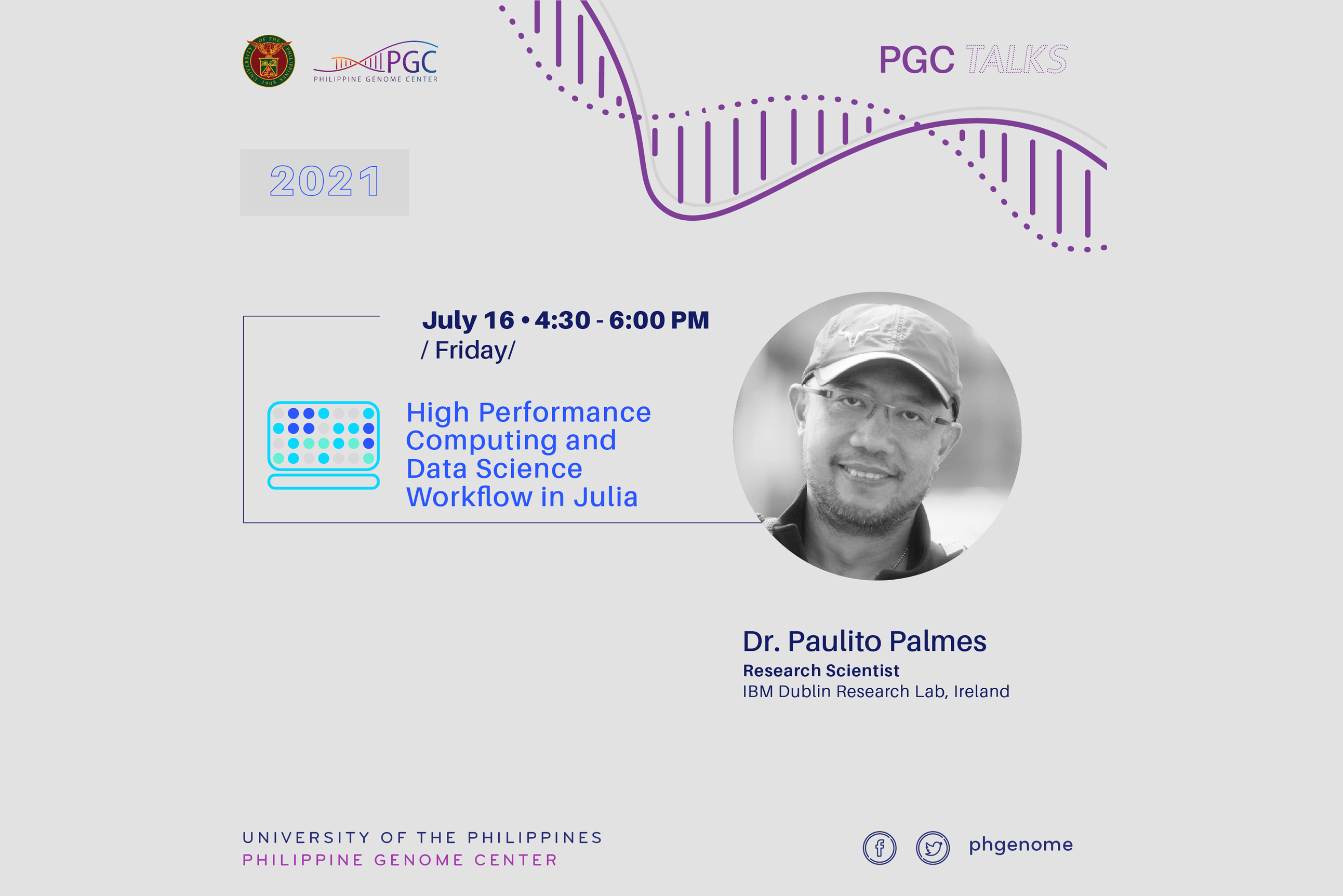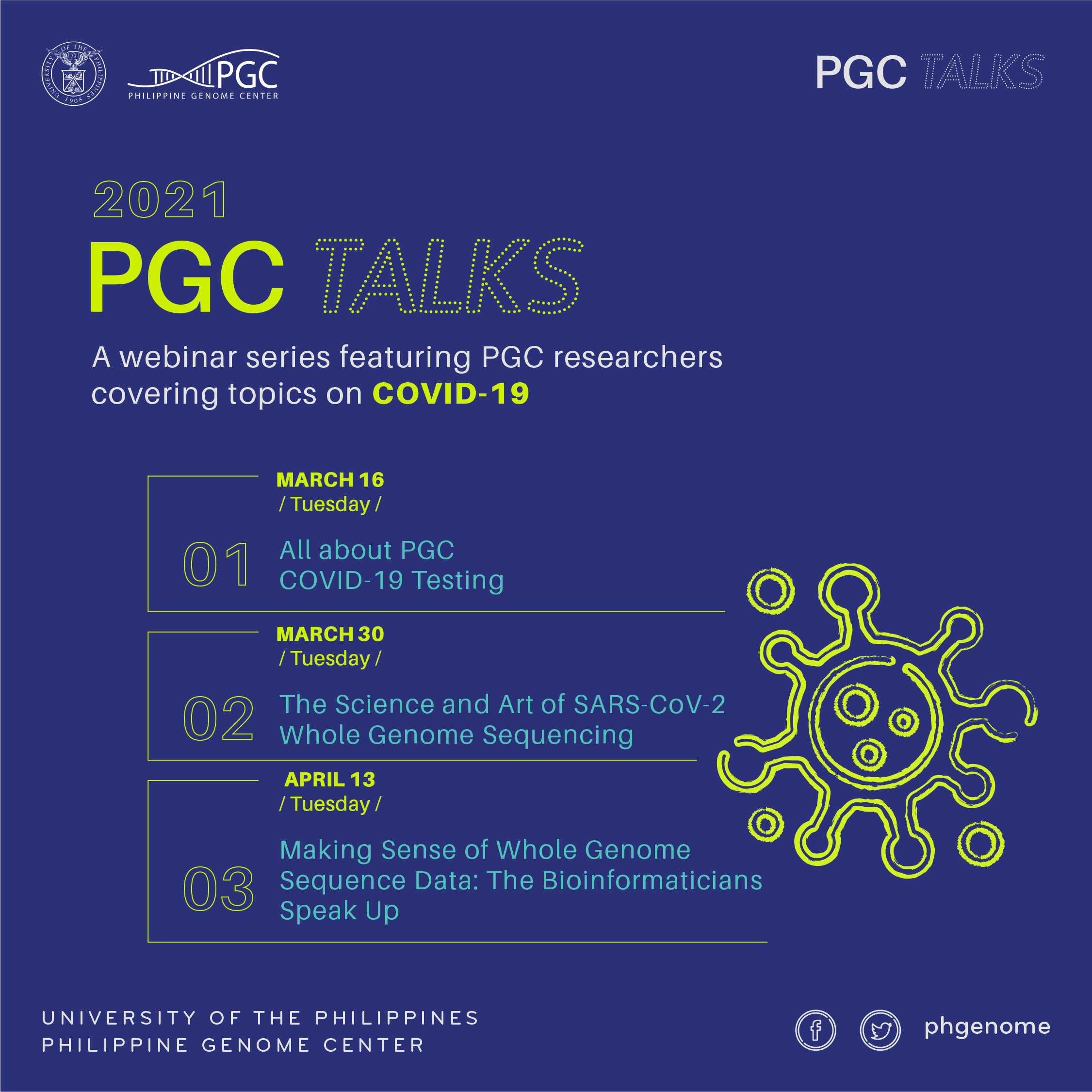#PGCTalks – PPMF webinar Protein Analysis, Instrumentation, and Applications Webinar The Protein, Proteomics, and Metabolomics Facility is hosting a #PGCTalks webinar on February 28, 2022 at 1 – 4 pm. Invited speakers will discuss the basic principles and applications of FPLC, Multiwavelength Spectrophotometer, and Circular Dichroism Spectropolarimeter. A Question-and-Answer portion will be held after the presentations. […]

#PGCTalks – PPMF Webinar
Expanding the Field of Omics Research in the Philippines: A Glimpse into the World of Proteins, Proteomics, and Metabolomics #PGCTalks REGISTER Date: November 15, 2021, Friday, 1:15-3:10pm This webinar is open to the public and registration is free. Registration will close on November 10, 2021. Newly launched PGC core facility PPMF is hosting #PGCTalks on […]

High Performance Computing and Data Science Workflow in Julia
HPC and Data Science Workflow in Julia #PGCTalks Date: July 16, 2021, Friday, 4:30-6:00pm This webinar is open to the public and registration is free. Abstract Julia is specifically designed from the start of its conception as a language for high-performance computation but at the same time highly interactive. To achieve this, Julia is one […]

#PGCTalks to feature topics on COVID-19 testing, sequencing, and bioinformatics analysis
#PGCTalks is back! The Philippine Genome Center is hosting mini webinar series #PGCTalks featuring various PGC experts and will cover topics on DNA sequencing, bioinformatics analysis, and testing related to COVID-19.

Genomic Studies for Otitis Media
Previously within an indigenous Filipino community with a ~50% prevalence of otitis media, we identified an A2ML1 mutation that confers a high risk of otitis media susceptibility and influences the relative abundance of specific bacterial taxa within the middle ear.

Cataloging planetary biodiversity
The Centre for Biodiversity Genomics (CBG) is a research organization dedicated to furthering our understanding of the world’s fauna and flora. Through a variety of approaches, researchers at the institute are discovering, cataloging, and describing biodiversity. DNA barcoding, an innovative technique developed at CBG, utilizes DNA sequencing technology for species identification.

A tale of sex: gene sharing between microbial species, genomes and microbiomes
Horizontal gene transfer (HGT) is an important evolutionary process that allows the spread of innovations between distantly related organisms. In this webinar, I will present recent findings on the process, driving factors and impacts of HGT in light of recent developments in next-generation sequencing approaches. I will discuss examples of HGT within species, between species and between microbial communities, and how these gene exchange networks drive the genetic and phenotypic diversity of microbes in nature and clinical settings

Transcription Factor Assisted Loading and Enhancer Dynamics Dictate the Hepatic Fasting Response
Fasting elicits transcriptional programs in hepatocytes leading to glucose and ketone production. This transcriptional program is regulated by many transcription factors (TFs). To understands how this complex network regulates the metabolic response to fasting we aimed at isolating the enhancers and TFs dictating it. Measuring chromatin accessibility revealed that fasting massively reorganizes liver chromatin, exposing numerous fasting-induced enhancers.

Systems Biology to Overcome TRAIL Resistance in Cancer Treatment
Over the last decade, our research team has investigated the dynamic responses and global properties of living cells using systems biology approaches. More specifically, we have developed computational models and statistical techniques to interpret instructive cell signaling and high-throughput transcriptome-wide behaviors of immune, cancer, and embryonic development cells.

A Convergent, Multidisciplinary Approach Towards Developing Microphysiological Systems: Tissues-on-Chips for Pharmacological Safety and Efficacy Testing
Advances in basic and preclinical science continue to fuel the drug discovery pipeline, however only a small fraction of compounds meet criteria for approval by the FDA.

